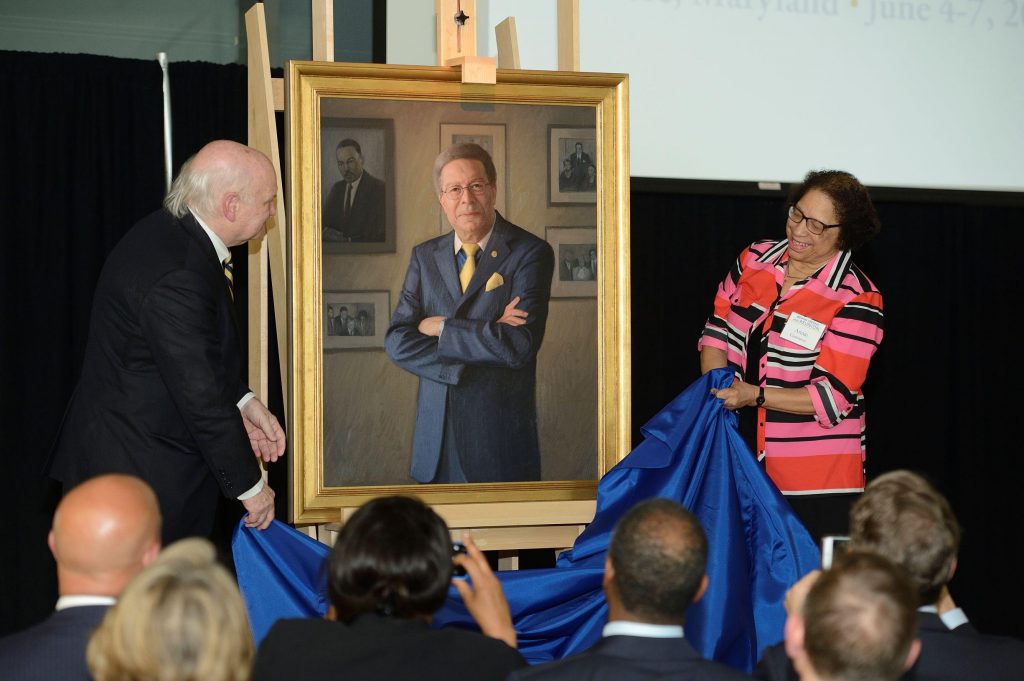Johns Hopkins UniversityEst. 1876
America’s First Research University
Dr. Annie Marie Garraway comes from a long line of role models. Growing up in Alabama with parents who were high school teachers — later, her father became president of then-Alabama State College, the nation’s first state-sponsored liberal arts institution for African Americans — Garraway, the oldest of six children, set an educational example for her siblings.
She studied mathematics at Northwestern University, earned a doctorate from University of California at Berkeley, and enjoyed a long career in telecommunications at Lucent Technologies. Her three children have three doctorates and two medical degrees among them.

Her younger brother, Dr. Levi Watkins Jr., embraced his sister’s example. Watkins, who died in 2015, was the first African American to graduate from Vanderbilt University with a medical degree and became Johns Hopkins’ first black chief resident in cardiac surgery. He was a passionate civil rights pioneer — the Watkins family attended Rev. Dr. Martin Luther King Jr.’s church in Montgomery, and getting to know Dr. King during Watkins’ high school years was a transformative experience for him. Watkins was a young surgeon at Hopkins when, in 1979, he established Hopkins’ national recruiting program for medical students of color, a model quickly emulated by other medical schools
In 1980, Watkins implanted the first automatic heart defibrillator at Hopkins, now a commonplace, lifesaving procedure. To help build a sense of community among postdoctoral fellows, he also established the Johns Hopkins Postdoctoral Association, another groundbreaking “first” imitated across the country. And each year, the Johns Hopkins Martin Luther King Jr. Commemoration program that Watkins founded in 1982 brings international speakers to JHU to celebrate the life of Watkins’ hero and friend.
Today, caring for and carrying out her brother’s impressive legacy is a labor of love for Garraway. A generous commitment from her estate and a current five-year pledge to The Levi Watkins Jr., MD, Endowed Scholarship Fund, established in 2008 by members of the Class of 1983, honor her brother by providing financial assistance to students of color at the Johns Hopkins School of Medicine. She is delighted that the scholarship was created during his lifetime, so he could see his lasting influence as a surgeon and as an advocate for students of color. “On arrival at Johns Hopkins, Levi was struck when he observed that so many of the Hopkins patients were black, but so few of the staff or students were,” Garraway recalls. “And this made such an impression on him that he undertook all he could do personally to address that.
Having donors who help finance medical education is as critical now as it was then.” Garraway’s philanthropic decision to give to Hopkins now and through her estate was an easy one. It’s simply what it means to be a Watkins: “I wanted to start seeing an impact right away. I wanted a near term and long-term vision.”
Garraway is also fulfilling her brother’s long-term vision. Two weeks prior to Watkins’ unexpected death in April 2015, she and her son traveled to Baltimore from her home in Ohio for the unveiling of Watkins’ official portrait. It was a proud moment, and the photos from that day are treasured possessions.
“[At his funeral ,] all the people whom he had mentored , inspired, and encouraged told me their story,” recalls Garraway. In the following weeks, while sorting through his papers, she uncovered his dream of creating similar scholarships for underrepresented minorities at his alma maters, Tennessee State and Vanderbilt. “I saw what he hoped to do with his legacy, but he died too soon,” says Garraway, who has created scholarships at those institutions as well. “The Hopkins scholarship is particularly meaningful, though, because this is where he really accomplished his life’s work. He had an impact on students, postdoc fellows, and surgeons. He made sure pathways were there for students and that they were prepared.”
Recently, Garraway received a two-page, handwritten letter from a woman she met at her brother’s funeral four years ago. The woman had worked at Hopkins and expressed feeling Watkins’ support and devotion as deeply as those he recruited to attend the School of Medicine. “She wrote to tell me that she was thinking of Levi and his impact on all people of color, whatever their capacity was at Hopkins. She told me that,‘He was fearless and would speak up for us.’ Then she told me that her 12-year-old grandson wrote a paper on Levi for Black History Month.”
That legacy, she’s certain, was also part of her brother’s vision. “He was so committed to surgery and to opening up opportunities for other people.”
Topics: Alumni, Faculty and Staff, School of Medicine, Support Scholars